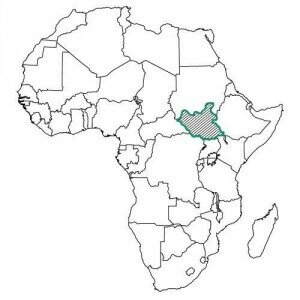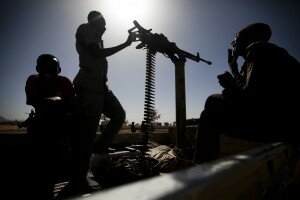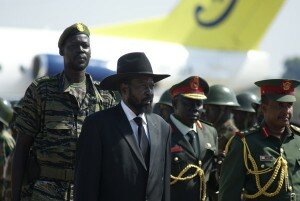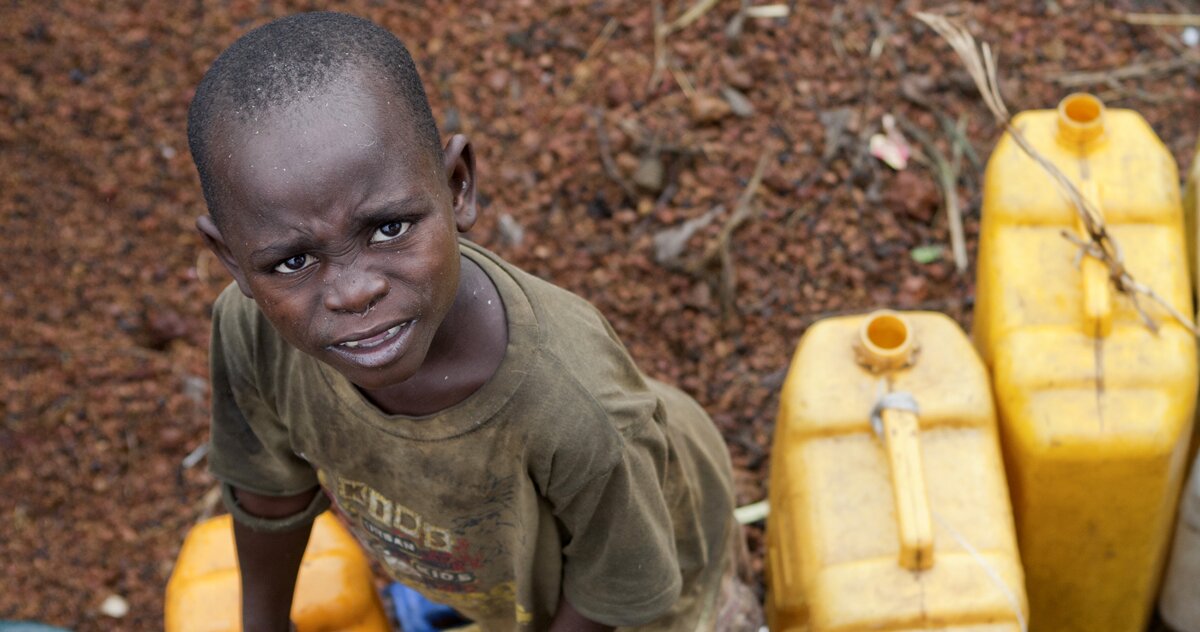A Fool for South Sudan
The UN Security Council has played the role of fool for too long on South Sudan. It is time for an arms embargo and additional targeted sanctions. 0
0  0 likes
0 likes
Blog Sub Title
Blog Sub Title
 The Situation
The SituationSouth Sudan became an independent state on July 9, 2011. Since then, however, the country has been plagued with governmental corruption, inter-communal violence, fighting between rebel militia and the government and border conflicts with Sudan.
Fighting in Jonglei, South Sudan has displaced tens of thousands and cut off life-saving aid to more than 100,000 people.
The violence includes abuses not only by militias and local tribes, but also by South Sudanese army officials. Additionally, South Sudan hosts some 222,000 refugees, the majority fleeing from ongoing attacks by the government in Sudan’s South Kordofan and Blue Nile states.
On January 9, 2011, the people of South Sudan voted to secede from Sudan and form a new nation. This vote was promised in the Comprehensive Peace Agreement (CPA), signed in 2005, which ended the brutal 22-year civil war between the Sudanese government and citizens in South Sudan. The January referendum displayed a landslide vote for secession, with nearly 100% of voters in the South voting in favor of separation. Six months later on July 9, 2011, the Republic of South Sudan officially became independent.
 The civil war between the north and south of Sudan resulted in the deaths of an estimated two million peopleand displaced an additional four million. Sudanese President Omar al-Bashir’s forces not only directly attacked the South but also manipulated tribal tensions to create internal conflict that still persists today. Despite the signing of the Comprehensive Peace Agreement (CPA) in 2005, Bashir continues to support instability in the South. His forces have bombed across the border on several occasions, including areas in which refugees have gathered.
The civil war between the north and south of Sudan resulted in the deaths of an estimated two million peopleand displaced an additional four million. Sudanese President Omar al-Bashir’s forces not only directly attacked the South but also manipulated tribal tensions to create internal conflict that still persists today. Despite the signing of the Comprehensive Peace Agreement (CPA) in 2005, Bashir continues to support instability in the South. His forces have bombed across the border on several occasions, including areas in which refugees have gathered.
Additionally, despite a peaceful separation, there remain several unresolved and contentious issues, including the status of the Abyei region, border delineation, popular consultations for two regions remaining in the North and the sharing of the South’s oil wealth.
The disputed region of Abyei was to hold a referendum on whether it would join the South or remain a part of Sudan, but Sudanese forces took over the town in May 2011 displacing over 110,000 people. A UN Mission (UNISFA) of over 4,000 peacekeepers has been deployed to the area and over 40,000 people remain displaced. Tensions remain over oil as most is located in South Sudan but must travel through pipelines in Sudan to be exported. Although a deal to split the revenues from southern oil between the North and South was incorporated into the 2005 CPA, lack of transparency and verification of this pact has continued to fuel mistrust and threaten peace.
In 2012, the Sudan People’s Liberation Movement (SPLM) shutdown the oil wells so that oil would not flow into pipelines that passed through Sudan. This continued for over a year, with no oil from South Sudan flowing to international markets via Sudan. Given the heavy reliance on oil revenues in both Sudan and South Sudan, continued threats to shut down oil pipelines between the two countries threaten not only the economic well-being of both countries, but also a return to war.
South Sudan has further been destabilized by an influx of some 220,000 refugees into border areas fleeing attacks by the Sudanese government. Much of the population in the states of South Kordofan and Blue Nile fought with the South during the civil war, but remained a part of Sudan after South Sudan’s independence. Even before independence was realized fighting broke out between the Sudanese Armed Forces and rebels in the two states escalating to aerial bombardment of civilians and cutting off of humanitarian aid by the Sudanese government.
 South Sudan, as the world’s newest nation, faces many internal political, economic and security challenges. The government is dominated by one party, the Sudan People’s Liberation Movement (SPLM), a group that is still working to transition to a legitimate government from its roots as a rebel group that fought for years in the bush.
South Sudan, as the world’s newest nation, faces many internal political, economic and security challenges. The government is dominated by one party, the Sudan People’s Liberation Movement (SPLM), a group that is still working to transition to a legitimate government from its roots as a rebel group that fought for years in the bush.
Infighting and rampant charges of corruption have troubled the new government and were cited by President Salva Kiir as reasons for dismissing his entire cabinet on July 23, 2013. Rivals, including the sacked Vice President Riek Machar have charged Kiir with moving toward dictatorship and vowed to oppose him in elections scheduled for 2015. Arbitrary detention and attacks on journalists have further called into question the direction of the South Sudanese government.
The South has a history of inter-ethnic fighting, as well as clashes between rebel groups and the Sudan People’s Liberation Army (SPLA), which have negatively impacted civilians in the region.
Over the past two years, inter-communal violence in Jonglei State has grown particularly worrying as local tribes carry out revenge attacks for cattle raids, razing entire villages in the process. The ethnic targeting, hate speech and rising numbers of deaths and displacement in Jonglei make these clashes particularly troubling.
Since South Sudan’s independence, over one thousand people have been killed as a result of the ethnic violence in Jonglei and tens of thousands more injured and displaced, with an estimated 100,000 cut off from life-saving aid in July 2013.
South Sudan has also had to contend with the threat of militia groups, many with a history of support from the North. Militia threats have especially tested the level of professionalization of the new army in Upper Nile, Unity and Jonglei States as several government soldiers have been implicated in heavy handed responses against civilians.
In Jonglei, the David Yau Yau militia, a group with a history and recent further implications of support from Sudan, has clashed with the SPLA and SPLA officers have been implicated in counter- attacks against civilians. In July 2013, the mix of clashes between SPLA, David Yau Yau militia and local ethnic groups cut off an estimated 100,000 people from life-saving aid.
Another prominent group responsible for war crimes and crimes against humanity is the Lord’s Resistance Army (LRA), a Ugandan rebel group that targets civilians in South Sudan’s Western Equatoria and Western Bahr el Ghazal states. Since September 2008, the LRA has displaced over 460,000 civilians, abducted more than 3,400 civilians and is responsible for mass atrocities including killings, rapes, mutilation and forcible abductions. In 2010, President Obama signed the LRA Disarmament and Northern Uganda Recovery Act and in November 2011, sent 100 U.S. military advisors to train troops in LRA affected countries, including South Sudan.
The international community has been heavily involved in South Sudan providing the new country with around $1 billion in aid each year covering food, drugs, text books, security training and emergency humanitarian assistance. The United Nations has a Mission in South Sudan (UNMISS) consisting of over 10,000 personnel that has attempted to improve governance in the new nation and establish peace and security including in troubled Jonglei state.
South Sudan faces immense development challenges, currently ranking near the bottom of the Human Development Index with nearly 90% of the population illiterate, 75% of the population has no access to health services, and 30% do not have access to clean drinking water. Beyond the immediate development challenges, the international community must constructively engage with South Sudan to promote good governance, economic development and security sector reform in order to achieve sustainable peace.
South Sudan continues to face immense challenges both internally and externally, even as its own leaders and security forces carry out serious abuses. We call upon the United States and international community to:


 Like the Cause &
Like the Cause &  Spread the Word
Spread the Word
 0 shares
0 shares 0 likes
0 likes
 0 shares
0 shares 0 likes
0 likes

 0 shares
0 shares 0 likes
0 likes

 0 shares
0 shares 0 likes
0 likes
Help stop genocide before it starts. Ask your Senator: Support the Genocide and Atrocities Prevention Act.
Act Now!